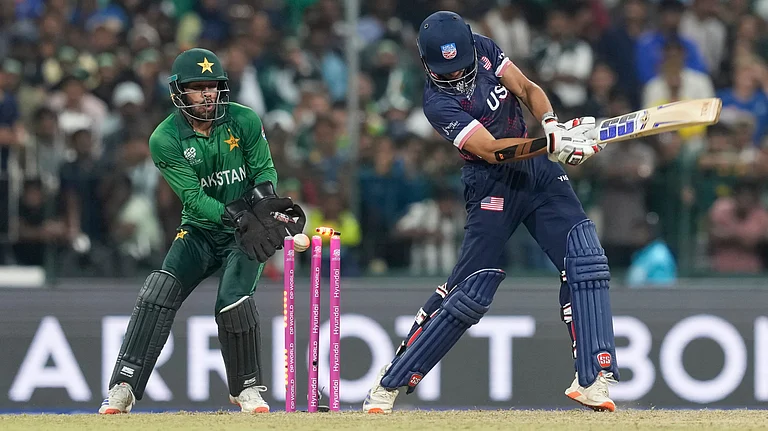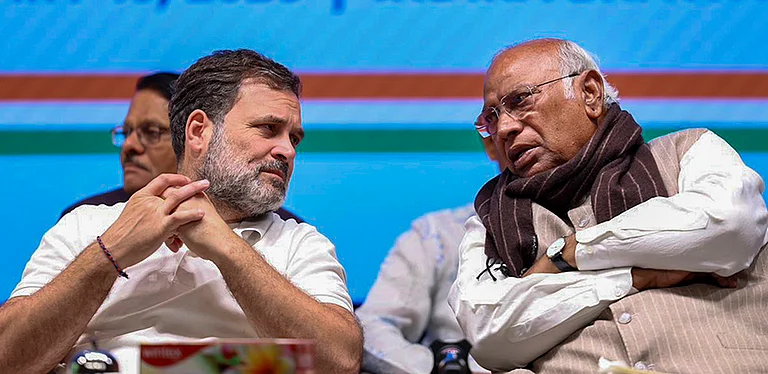
Since public perceptions change, the timing of the rumour must be right for its success. Rumours of Kashmir being sprayed with nerve gas wouldn't cut much ice in peace-time. But it gained currency during the peak of the Kargil conflict. Similarly, the salt-shortage rumour gained credibility because the city was already reeling under an onion crisis. It was only logical to conclude that a salt crisis was possible.
Political rumour forms an integral part of every party's propaganda armoury. The effectiveness of a party's communication experts can be measured by the success of their rumour-mongering. There are three ways a party communicates with voters—direct contact through rallies and public meetings, through its workers and through the mass media. The second is the most effective means of communication, and more often than not for spreading rumours at the village level.
The efficacy of a party's propaganda machine depends on (a) the strength of its cadre and (b) communication between the centre and the party worker. Here, cadre-based parties have the edge. The Sangh parivar's alleged rumour-mongering often compelled the late V.N. Gadgil to say: "rss stands for 'rumour-spreading society'." To the rss is attributed the famous 1975 rumour of sterilisation being practised in Delhi schools.
Every now and then, Sonia Gandhi's Catholic and Italian moorings become raw material for rumours. After Vajpayee was toppled in 1999, the rumour that Sonia's mother and sister had flown down from Italy to witness her triumphant swearing-in as PM, damaged Congress prospects in the general elections, at least in Delhi.
The primary purveyors of the political rumour are invariably educated people, while their target audience is by and large the semi-literate or the illiterate. The life of the rumour is determined by how long it takes to explode, or to become a fact. Should there be no strong denial or reaction then the rumour is no longer an untruth.
Gossip and rumour overlap, with the difference that the former is invariably personality-based. Internecine rivalry (who's shafting whom), petty ambitions (who's lobbying for what), graft (who made how much) and sexual peccadilloes (who's sleeping with whom) are favourite subjects of gossip.
Rumours appear in gossip columns when they can't be substantiated—they may or may not be based on truth. The marital indiscretions of actor/MP Shatrughan Sinha appeared as a news item in a Hindi daily (based on a divorce petition) but those of the first (foster) son-in-law appeared in the same daily as a diary item.
Again, transparency is the key—rumour thrives in inverse proportion to media access. The more restricted the information, the more frequent the rumours. Palace gossip flourishes, whether it's centred around the Windsors or 10, Janpath or 7, Race Course Road when the goings-on tend to be clouded in secrecy. Observes Sheth: "Gossip is the bane of all capital cities."
Political rivalries are played out in newspapers through rumours and counter-rumours which pass off as news analysis. The current top rumour in the Congress is that Madhavrao Scindia is preparing to show his "Maratha colours" and attempting to split the party. There's no evidence, merely some statements from Scindia on the formation of an alternative government and the party's rumour mill, activated by Scindia's rivals in the cwc.And no sooner had Fathima Beevi sworn in Jayalalitha than Najma Heptullah's detractors got into the act, claiming the TN governor had displaced her as the frontrunner in the race for vice-president. There was no logical basis for this but it was picked up. Hatched by the media and fed to politicians, the rumour acquired a life of its own.

But the one that captures more media space and public imagination is the on-off feud between the PM and his home minister. To quote a three-wheeler driver post-Tehelka: "This Tehelka business is nothing but a conspiracy to destabilise the PM. Advani is behind it. You know, he comes from Pakistan." Rumours surrounding the PM's health have also originated from what the press describes as the "Advani camp".
Within political formations, rumours proliferate if there is no grievance-redressal mechanism. Unable to vent their pique directly, disgruntled party members resort to rumours. A classic instance of a successful rumour was the campaign against Vincent George. In late 1999, an unsigned pamphlet did the rounds, charging George with all kinds of misdemeanours. It found a ready audience among partymen, who spoke of nothing else for days. The press then followed it up and sure enough, it turned out that the cbi was investigating George. Says Congressman and ace-pamphleteer Namit Verma: "I was amazed at the number of people who took credit for the pamphlet...it was an indication of just how angry they were with George."
The bjp party worker is no less disgruntled, accounting for the widespread rumours of a Vajpayee-Sonia jugalbandi.
Mediapersons know who the rumour-mongers in each party are. All politicians indulge in it, but some do it all the time. Deputy chairperson Najma Heptullah's room in Parliament is the hub of gossip, as is that of parliamentary affairs minister Pramod Mahajan. The press plays ball with politicians/bureaucrats for its own reasons, which may not be kosher. Gossip columns are more popular than hard news and sell more copies; small wonder gossip is spilling over into news pages. In the age of TV, bare-bones news is no longer enough. Hence, the search for news behind the news.
The main centres of political gossip are Parliament's Central Hall, Lodi Gardens, Nehru Park, the Press Club of India and the iic. But the palm, says MP and gossip writer Rajiv Shukla, goes to the paan shop in front of the Indian Newspaper Society office, where journalists meet and exchange gossip throughout the day. The Internet, particularly sites like sword oftruth.com and the now defunct delhigossip.com, were quick to catch on.
Intelligence agencies also have a major role to play in rumour-mongering, says a senior IB officer in charge of Delhi. The government of the day often uses rumours as sounding boards. Information is leaked in the form of rumours and feedback obtained. This is done especially during elections. One classic instance was press reports quoting IB sources as saying the Babri Masjid would fall—events, however, overtook the rumour before it could gain currency. The government may also use the rumour as a safety valve, to defuse anger over an impending negative decision. For instance, the cut in ppf interest rates was endlessly discussed before being actually implemented in Budget 2001.
In Delhi, say intelligence operatives, rumours are disseminated through several nodes. The most important one being the dms (Delhi Milk Scheme) booth, where people line up from 5 am."That's where, we believe, the rumour about idols of Ganesh drinking milk originated and spread in the early morning," observes the IB officer. The doodhwala, who comes to Delhi from the hinterland, is another source of rumour. The monkey man buzz originated in Ghaziabad and then spread to East Delhi through the gwala network.
In the walled city, the paan shop and the halwai are nodal centres for rumours. In these urban chaupals the Punjab Kesri is discussed from first page to last. In government colonies, barber shops play a similar role—restricted information from government offices is shared and exaggerated.
Like the government, corporate houses also use rumours. Says Cherian: "If a business house is interested in the power sector of a state and wants to ensure that a particular decision is not taken, it spreads the rumour that the CM has taken money... rumours are often planted by lobbies interested in the power and petroleum sector or in the stockmarkets."
But if all rumours were to be believed, the ranks of our politicians would have been considerably thinned by hiv (In one case, by a viagra-induced heart attack). Others would have a perpetual case of priapism fuelled by shilajeet, royal jelly and rhinoceros urine. And still others would be rich enough to figure in Fortune's top 100. The underworld and corporate lobbies would run the government and the isi would have smuggled in more illicit arms than are contained in our ordnance depots.
Bhavdeep Kang With Davinder Kumar


























